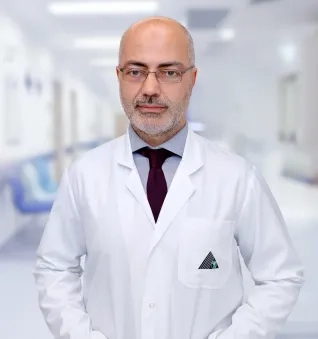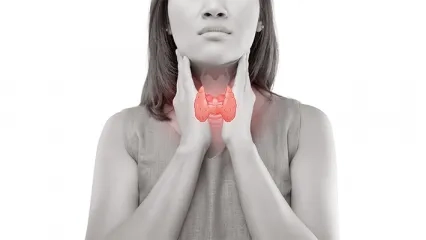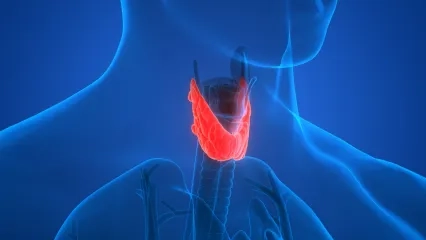Alo Yeditepe
Alo Yeditepe
Thyroid Storm Can Turn Life Upside Down
It is known that many diseases occur when vital thyroid hormones work more or less. Endocrine Surgery Specialist Prof. Dr. Erhan Ayşan, who pointed out that if the increase in hormone secretions is given to the blood very quickly and abundantly, the "thyroid storm" may occur, said, "Here is the storm inside us."
Thyroid hormones play a decisive role in all our functions, from walking, speaking, digesting, heart rate, blood pressure, pulse, and even thinking and sensing. Hypothyroidism and hyperthyroidism can occur when the hormones T3 and T4, which are of great importance in our daily lives, work more or less. Prof. Dr. Erhan Ayşan, General Surgery and Endocrine Surgery Specialist from Yeditepe University Hospitals Parathyroid Transplant Clinic, warned that these problems, which affect a large part of society, can be confused with different diseases, and warned to be careful about the symptoms. Emphasizing that the table, which is defined as thyroid storm, which occurs especially if thyroid hormones are given to the blood suddenly and too much, is of special importance in terms of producing very serious consequences, Prof. Dr. Erhan Ayşan continued as follows:
"While this storm sometimes gives signs that can be seen from the outside, sometimes it proceeds by damaging the internal organs without giving any signs to the outside. The heart and brain will take the first place among these damages. Rhythm disturbances and cardiac arrest may develop due to the rapid beating of the heart. There may be cerebral hemorrhages due to cracks in the cerebral vessels. The resulting organ damage varies depending on the patient's age and existing comorbidities. Internal organ damage occurs earlier in elderly patients. In people with comorbidities, such as a person with heart failure, the effects of thyroid storm on the heart can be much earlier and much more severe."
Case Develops Suddenly
Reminding that there is a thyroid disease that the patient is not aware of in case of thyroid storm, but this is not a rule, Prof. Dr. Erhan Ayşan said that thyroid storm may also be the first sign of a thyroid disease that has just started. Prof. Dr. Ayşan continued as follows: "Overwork of the thyroid gland, production of excess T3 and T4 hormones are called hyperthyroidism. Graves' disease is the most common cause of hyperthyroidism. In fact, thyroid storm is a type of hyperthyroidism, but the production of T3 and T4 hormones is much higher in this table, and the table develops much more suddenly. However, the thyroid is an endocrine organ and, like every endocrine organ, is affected very quickly by stress. Pregnancy is also a stress and can trigger thyroid storms along with thyroid diseases. Thyroid storms without symptoms may be confused with many diseases. For this reason, unnecessary tomography, MRIs, angiographies, and endoscopies are common."
The Earliest Finding Is Palpitation
Prof. Dr. Erhan Ayşan said that the earliest and most obvious finding of the thyroid storm table is "palpitations". The patient, who felt an obvious increase in heartbeats in the left chest region, describes this situation as "it is almost as if my heart is going to go out". Prof. Dr. Erhan Ayşan explained the following about the subject: "At this time, there is an increase in the number of pulses and the pulse is not rhythmic; it is seen that sometimes the pulse beats are opened and sometimes these intervals are shortened. Continuous increases in heart rate cause sleep disorders, especially with palpitations at night. Especially in physical activities that increase the number of pulses, this number increases even more and makes the patient very seriously comfortable. People immediately notice palpitations and may think it is heart disease and go to a cardiologist."
An Emergency for Elderly Hypertension Patients
Another symptom of a thyroid storm is high blood pressure and the headache that may occur due to it. Drawing attention to the fact that this situation may pose a life risk, especially in elderly patients with high blood pressure (hypertension), Dr. Erhan Ayşan said, "Since these people also have vascular stiffness, the veins may not withstand the rising blood pressure and brain hemorrhage may occur. This situation is a life-threatening emergency."
Prof. Dr. Erhan Ayşan said about the other symptoms that may be experienced: "Sleep disturbance, waking up frequently at night, and being uncomfortable with the heat are among the common symptoms we encounter in patients. Therefore, it is beneficial for people who walk around in thin clothes in cold weather and express that they are not cold to consult an endocrine specialist. However, rapid weight loss without dieting is another finding. The phrase "I eat but I do not put on weight" may make many people happy, but they may be experiencing a thyroid storm and the internal organs are getting seriously tired due to the acceleration of metabolism. These people may have to deal with serious organ failure in the future. Changes in toilet habits, frequent visits to the toilet, and diarrhea attacks are other findings that can be seen related to the digestive system."
The Patient's Psychology Also Deteriorates
Emphasizing that the thyroid storm table affects the physiological structure of the individuals as well as their psychological status, Prof. Dr. Erhan Ayşan said, "Emotional disorders, depression (introversion) or irritability (anxiety) can also be seen in these patients. The fact that there are changes in the behavior of someone you have known for years, whose personal characteristics and habits you know, that they reduce their shares with you or on the contrary, that they get angry and angry about unnecessary things is among the factors that make the thyroid storm think."
As Soon As the Complaints Start, a Physician Should Be Consulted
Stating that the diagnosis of thyroid storm can be made with laboratory tests, Prof. Dr. Erhan Ayşan explained the following about what can be done in the diagnosis: "First of all, when complaints arise, it is absolutely necessary to apply to the physician by doubting the existence of a problem. In laboratory examinations, T3 and T4 hormones are found to be very high and the TSH hormone is low. However, the patient must have a thyroid ultrasound. The entire thyroid gland may be working quickly, or there may be a nodule in the thyroid gland that is working hard, and the cause of the disease is this nodule. All information is available with ultrasound. Therefore, ultrasound is a diagnostic method that should be done because it will provide information about both the cause of the disease and the treatment method."
Early Diagnosis Protects From Organ Damage
Stating that drugs are the first step of the treatment of thyroid storm, different options can be applied in the treatment in the following processes, Prof. Dr. Erhan Ayşan explained about the treatment of the disease: "We have reliable drugs that will block the hormones secreted from the thyroid. Starting them in the right doses will not only relieve the patient in a few days but also protect the internal organs from the effects of the storm. In the later period, treatment can be continued with medication, radioactive iodine (atomic treatment), or surgery. The endocrine specialist must decide which of these options to apply. Thyroid storms can recur and therefore, correct treatment should be initiated, and follow-up should not be interrupted at the initial diagnosis stage."
Press Coverage: haberler.com | gazetevatan.com | takvim.com | tv100.com | hurriyet.com | sabah.com | cnnturk.com
About
Faculty and Year of Graduation:
Istanbul University, Cerrahpasa Faculty of Medicine, 1994
”
See Also
- What is a Parathyroid Adenoma? Symptoms and Treatment
- What is Calcitonin Hormone? Calcitonin Hormone Deficiency
- If the Size of the Thyroid Nodule is Over 4 cm, Be Cautious!
- How Does High Calcium in Blood Cause Complaints?
- A First in the Literature: Parathyroid Cell Obtained from Thyroid Stem Cell
- Diagnosis in Thyroid Diseases
- Assessment of Hyperthyroidism
- Hashimoto's Thyroid Disease
- Thyroid Tumor (Cancer)
- Graves' Disease
- Thyroid Nodules
- Thyroid Surgery
- Assessment of Hypothyroidism
- What is the Harm of High Calcium in the Blood?
- Frequently Asked Questions in Thyroid Diseases
- Atomic Therapy (Radioactive Iodine Therapy)
- Which Thyroid Nodule Can Be Treated Without Surgery?
- She Was Relieved of Her Pain When the Missing Parathyroid Gland Was Found in The Chest Cavity
- Recovered From Thyroid Nodule with Needle Melting Method
- Stress Triggers Thyroid Diseases; These Occupations Are At Risk!
- Turkish Physician Developed a Novel Method for Parathyroid Transplant
- What Should Be Considered After Parathyroid Surgery?
- Parathyroid Diseases and Treatment
- They Said It Was Thyroid Cancer, But It Turned Out to Be Parathyroid Adenoma!
- The Frequency of Thyroid Nodules and Thyroid Cancer in Young People is Increasing!
- Thyroid Cancer Treatment Is Possible Without Removing The Entire Thyroid Gland
- Thyroid Storm
- T4 Hormone in 13 Headings
- Questions About Thyroid Diseases
- Thyroid Diseases
- Goiter (Thyroid Gland) Biopsy
- Radiofrequency Therapy in Thyroid Nodules
- What Is Autoimmune Hypoparathyroidism or Hypocalcemia?
- What Is The Loss of Low Calcium Level in Blood?
- What Is The Symptoms of Calcium Level Elevation (Hypercalcemia)?
- How It Is Made The Parathyroid Adenoma Operation?
- What Is Parathyroid Hyperplasia?
- Parathyroid Tumors
- What Are The Parathyroid Glands?
- The Incidence of Thyroid Cancer Has Increased! There is Turkey in the Research!
- Key Surgery Performed In Turkish Hospital For First Time
Alo Yeditepe







